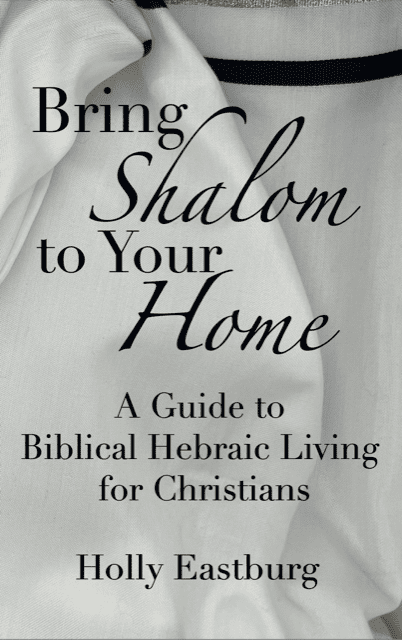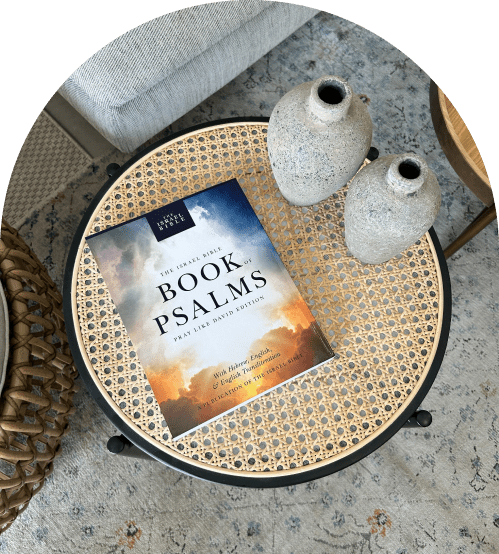
You’re Not Alone: The Growing Hebraic Christian Faith
One of the things I enjoy about having a blog is that I get to hear from Christians around the world on the Hebraic path. Thank you for all your comments and emails!
We Often Start As Islands

I hear many different things from my audience, but I hear one thing far more than anything else. Those who read my website tell me they’ve been convicted to practice their faith differently but find themselves alone. Their churches, families, and even spouses may be unsupportive of their journey, and lacking community in their new faith walk, they find themselves alone.
But this isn’t the case! They’re not alone. Although they may find themselves alone initially, many who have been on this path for years remember starting that way. However, now, they have a community of Believers on a similar path, and may even refer to that group as “family.”
What I’ve Witnessed
I’ve been on the Hebraic path for about eleven years and have seen it grow by leaps and bounds. When I was first convicted to divert from traditional Christianity, the resources were minimal. Now, there are many resources for those in our faith, and they’re continually increasing.
Internet Search
It used to be that an internet search of “Hebrew Roots,” “Christian Jewish Roots,” or other related terms led to just a few obscure results, which were low in the search results. But now, searching for these exact terms reveals many related results from numerous sources. There are blogs (like this one), videos, books, etc., on these topics on the internet, and they’re more accessible and easier to find.
Aside from Holy Branches, here are a few sites you may find exciting and educational.
Hebrew For Christians
Hebrew Roots of Christianity
119 Ministries
Hebraic Roots Network
Shopping
When I search for Hebrew Roots books on Amazon, pages of related results will appear, where there weren’t many at the beginning of my journey. There’s even a homeschool curriculum for my children in this area, which is astonishing as it wasn’t available when my older ones were young—a few years ago!
The other thing I find much more prevalent in online stores is the items used in the practice of the Hebraic faith. Shofars, hanukkiahs, Messianic jewelry, clothing, etc., are available in many options, specifically for Christians in this faith!
Congregation Search
Searching for Hebraic and Messianic congregations is another area where I see this Movement’s growth. Results were minimal when I searched for Messianic congregations in the U.S. just a few years ago, but now many congregations appear in these searches, making it easier for those seeking fellowship to find it.
- 119 Fellowship Finder
- Answers in Torah Messianic Jewish Congregations Direcctory
- Union of Messianic Jewish Congregations (UMJC) Directory
For more info on finding a community for you and your family, check out How to Find a Hebrew Roots Congregation.
It’s exciting to be part of a growing faith and return to our Biblical roots. Look a little further if you feel you’re the only one on this path! We’re here, and our numbers are growing each day. Praise God!
Comments (2)
Leave a Reply Cancel reply
Search
Recent Comments
- Holy Branches on Explaining The Chosen: Season 2, Episode 1: Thunder
- robert silvernail on Explaining The Chosen: Season 2, Episode 1: Thunder
- Robin Meyer on Explaining The Chosen: Season 3, Episode 3: Physician Heal Yourself
- Joe on The Names of God: יהוה, the God of Israel
- Bradford on 9 Hebrew Words to Bring You Closer to God






I have very much appreciated many of your posts! I grew up as a Christian (baptist and presbyterian churches) who also celebrated Passover at home. I find that a blend of the church calendar with some of the Jewish calendar celebrations has blessed my family with a deeper and broader understanding of just how powerful and loving our God truly is, all while keeping our focus on our Messiah as the perfect example – I feel swept up in the longest and most beautiful story of redemption ever written! The traditional church calender follows Jesus’ life, teachings, and works while he was here on Earth, and the older Jewish traditions celebrate the rich history of God’s faithfulness and power. It often makes me sad when I meet Christians who don’t value the Old Testament (Jewish Scriptures) because God has given us such a rich history of his faithfulness and wisdom in these scriptures.
I would like to share how our family has celebrated Christmas and Easter in a faithful way – these two holidays are not mentioned in the Bible and were entangled with other pagan holidays, but if celebrated faithfully, they are simply a time to be humbled by Jesus perfect sacrifice for us and to long for his second coming. First, we never “believed in” Santa – rather, we were taught about St. Nicholas, the man who inspired the Santa myth and our parents emphasized that we are only to ever believe in Jesus. Also, we celebrated Advent in a very unique way. Each day of Advent, we would light the candle(s) and read an Old Testament prophecy and a New Testament fulfillment, which taught us about the rich history of God promising a Messiah and the amazing ways that he provided our Messiah in Jesus. We also read prophecy/promises that have yet to be fulfilled in Jesus’ second coming (what a glorious day it will be!). As an adult, my husband and I still practice these traditions, but have added a daily Advent devotional with a focus on longing for Jesus to come again that incorporates additional scripture, worship, and prayer. Christmas day is a time to spend celebrating God’s goodness in sending his son, Jesus, to us in human form – we spend this time together in worship and celebration. We also practiced gift giving, but my family limited it to 3 gifts per person on Christmas morning as a reminder of the three gifts the Magi brought Jesus.
As for Easter, Lent is a beautiful season of re-centering our focus on Jesus by cutting something out from our lives. I usually use this as a way to cut out things that tempt me to sin, and treat it as a fasting time where every time I think of the thing I gave up, I replace that thing with prayer. Often the things I prayerfully consider cutting out of my life during Lent stay cut out of my life as God strengthens me to lean on Him more and more. Another way to interpret giving something up during Lent is to be reminded of the suffering of Jesus for our sins each time we feel a small amount of suffering over what we gave up. On Good Friday, we attend a church service where we read scripture together (Mark 14 and 15 this year) interspersed with congregational songs (usually more somber ones). In my family, the following day (Sabbath) is the day we celebrate Passover Seder. Then, on Sunday we celebrate the most joyous news of all time: that Jesus defeated death and sin and made a way for us to be with him forever!
I only add this because just because a celebration is not in the Bible does not mean it is sinful as was noted in the article you linked about the Pagan roots of Christmas. I know you are not necessarily endorsing the article, but in case anyone is considering throwing out Christmas and Easter after reading it, I wanted to share these thoughts. It is true that Pagan traditions were “Christianized” and it is important to prayerfully consider what we may need to remove from these celebrations due to this entanglement. However, God can redeem even this, and I have seen the churches I am and have been a part of celebrate in very faithful, intentional, and scripturally rich ways. Celebrating our Jesus should never be considered sinful!
We are trying to begin celebrating the Sabbath as an important rhythm that Jesus himself practiced and that was laid out in the Ten Commandments, but have found it hard as I am a nurse and nursing schedules require working on a Sabbath here and there (after all, people do get sick and injured on Sabbath, and as Jesus noted in Matthew 12:10-12, it is lawful to do good on the Sabbath). I am prayerful that we will be able to get into the practice of Sabbath/Shabbat before we have children. I am greatly enjoying your suggestions, recipes, and ideas for Sabbath!
Hello, Madeline!
I applaud your efforts (as well as that of the churches you’ve been a part of) to celebrate these aspects of your faith in a meaningful way. I’ve heard of many ways to celebrate Christmas and Easter that are more God-focused and my family used to have many of these traditions as well. Because they’re not in the Bible and that they’ve become entangled with pagan traditions isn’t the only reason some choose not to celebrate Christmas and Easter, though.
For example, when my family started observing the Biblical Holy Days as laid out in the Bible, we found we were celebrating every part of God’s redemption story – past, present, and future. We have no need to add Christmas and Easter because our God and our Savior and what they have done and will do is celebrated throughout the year in the way God planned for us to celebrate these things.
I’m guessing you’ll discover this as well, as so many have. I love to hear that you celebrate Passover and that you’re trying to figure out how to observe the Sabbath. The Sabbath is a great place to start! I know it’s difficult to see how to do it at first, especially because of your profession, but I know it will eventually be a blessing to you.
As far as observing the Sabbath goes: You’re correct that we need nurses to work on the Sabbath and that Jesus endorsed that through the examples he gave. God will see that your heart is turned toward Him in wanting to observe the Sabbath and He will show you how to do it as a nurse if you honestly seek His guidance, which it appears that you are.
Blessings to you and your future family on your walk.